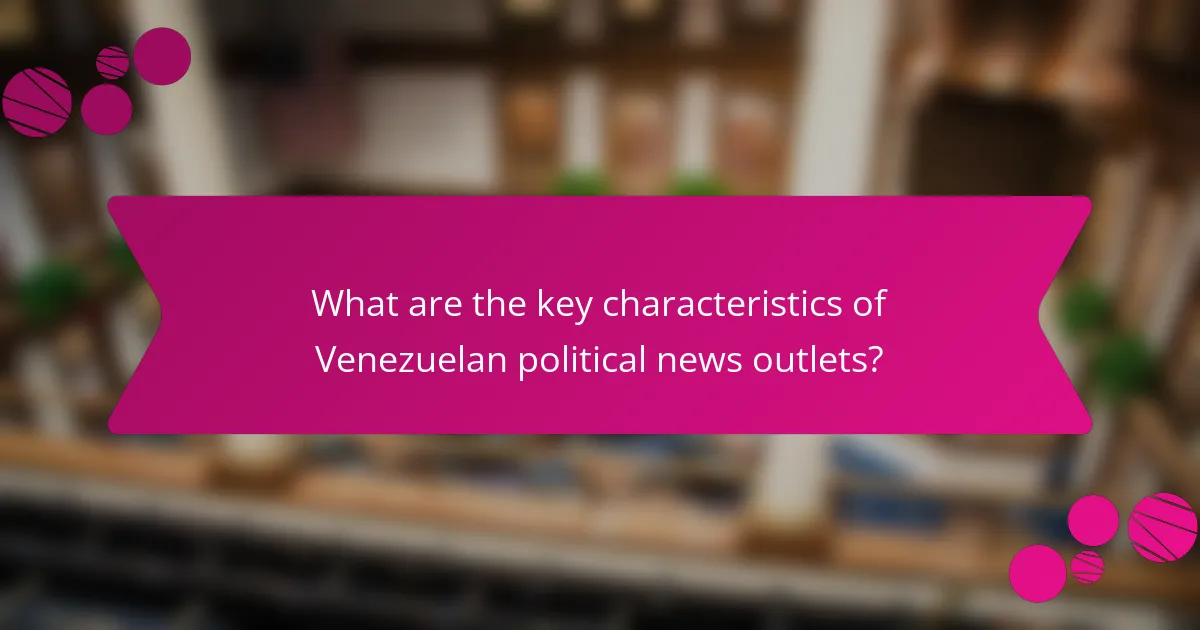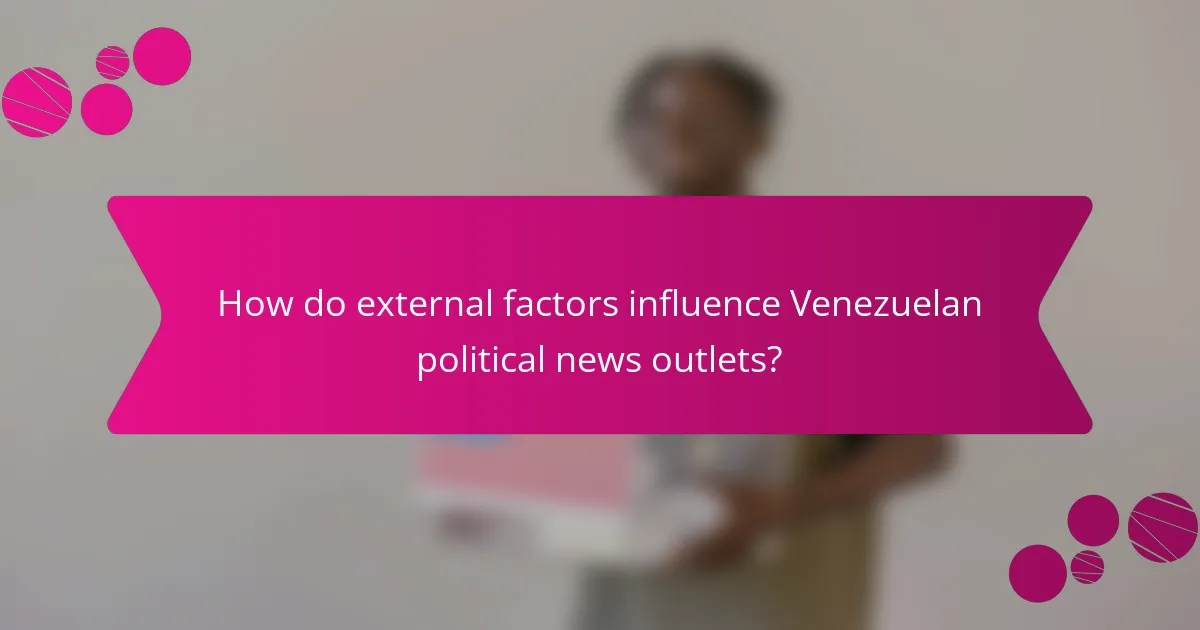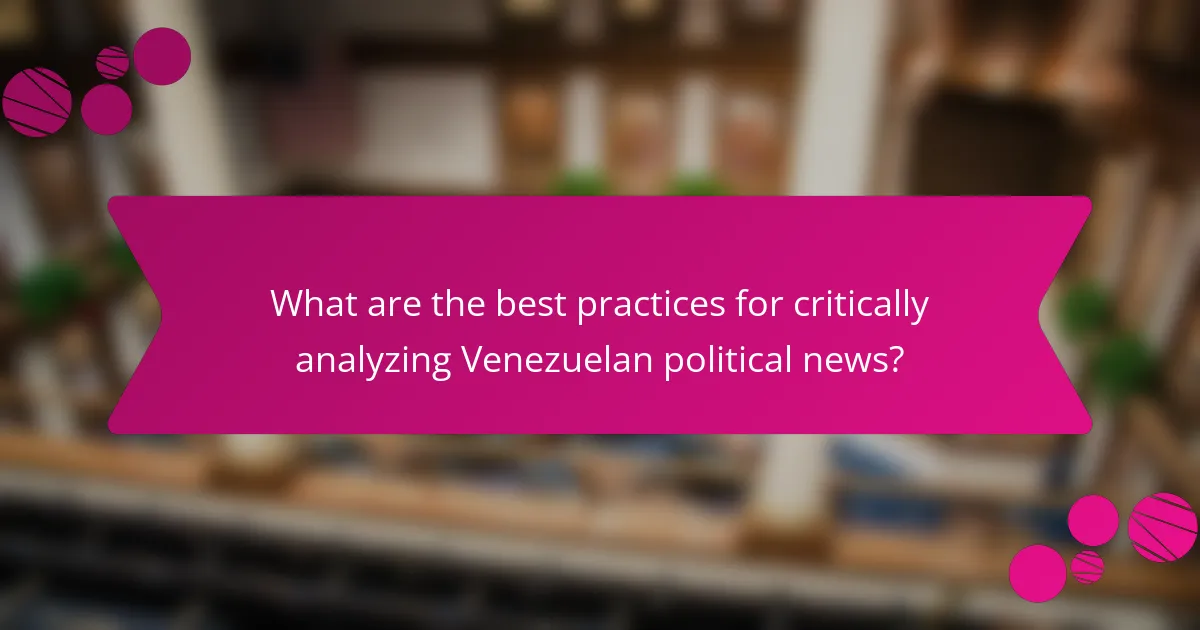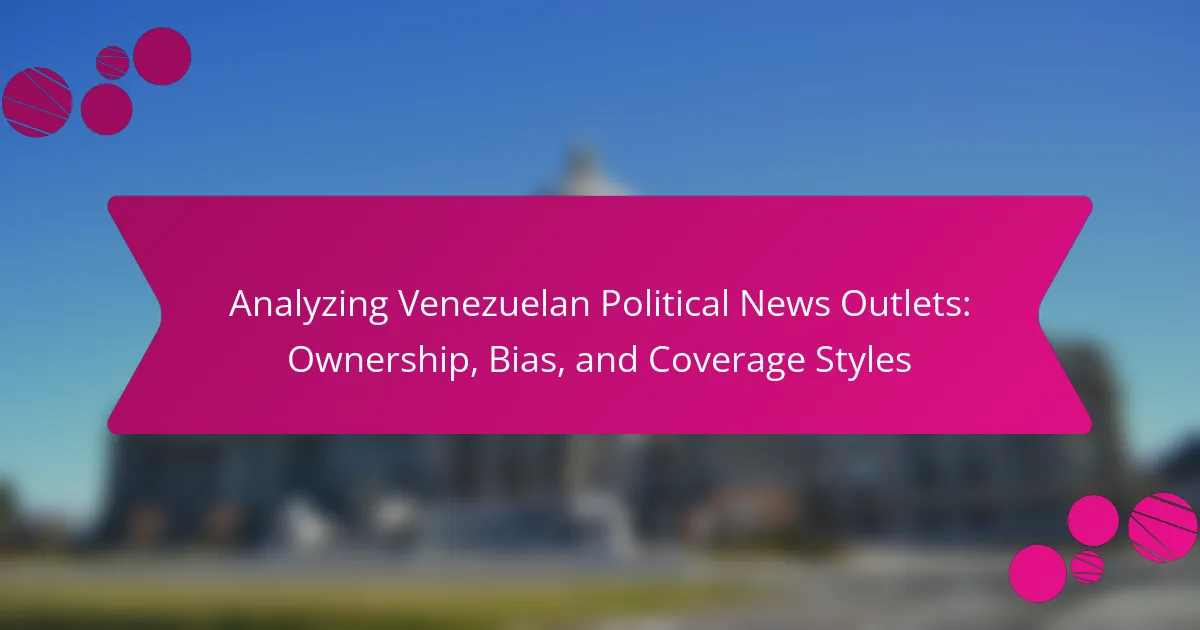
What are the key characteristics of Venezuelan political news outlets?
Venezuelan political news outlets are characterized by a mix of state control and private ownership. Many outlets are subject to government regulation and censorship. The media landscape is polarized, reflecting the country’s political divisions. Pro-government outlets often promote official narratives. In contrast, opposition outlets face harassment and closure. Journalistic integrity is frequently compromised due to political pressures. Access to information is limited, impacting coverage quality. These factors create a challenging environment for unbiased reporting.
How is ownership structured among Venezuelan political news outlets?
Ownership among Venezuelan political news outlets is concentrated in a few key entities. The government controls major state-run media, influencing the narrative. Private outlets often face pressure and censorship. Many independent journalists operate under threat, limiting their reach. Foreign ownership is also present, complicating the media landscape. This structure reflects a broader trend of media control in authoritarian regimes. The lack of diversity in ownership affects the plurality of viewpoints. Reports indicate that this concentration has intensified in recent years.
What are the implications of ownership on news coverage and bias?
Ownership significantly influences news coverage and introduces bias. Media outlets owned by individuals or corporations often reflect the interests of their owners. This ownership structure can lead to selective reporting, prioritizing certain narratives over others. For instance, in Venezuela, government-owned media tends to support state policies and portray opposition negatively. Conversely, privately owned outlets may emphasize dissenting viewpoints. Research shows that ownership concentration correlates with a lack of diverse perspectives in news reporting. This dynamic can skew public perception and limit informed discourse. In summary, ownership shapes the lens through which news is presented, impacting both coverage and bias.
Which entities own the most prominent news outlets in Venezuela?
The most prominent news outlets in Venezuela are owned by various entities. The government owns outlets like VTV and Telesur. Private entities include Globovisión, which is owned by a group of investors. El Nacional is another significant outlet, owned by the Cisneros Group. The ownership structure reflects a mix of state and private control. This dual ownership influences the editorial line and coverage of political events. Government-owned outlets typically support the administration. In contrast, privately owned outlets often face challenges and censorship.
In what ways do bias and editorial stance manifest in Venezuelan media?
Bias and editorial stance in Venezuelan media manifest through selective reporting, language use, and ownership influences. Selective reporting often emphasizes government failures while minimizing opposition shortcomings. Language use can reflect either support or criticism of political figures, influencing public perception. Ownership influences arise from media outlets being controlled by political allies or opponents. This control shapes editorial policies and coverage priorities. For instance, state-run media typically promote government narratives. In contrast, independent outlets may highlight human rights abuses and economic crises. Such dynamics create a polarized media landscape, impacting how information is presented to the public.
How can readers identify bias in news reporting?
Readers can identify bias in news reporting by examining the language used in articles. Biased reporting often employs emotionally charged words. These words can sway public opinion rather than present facts. Additionally, readers should analyze the sources cited in the articles. A lack of diverse sources may indicate a biased perspective.
Another method is to compare coverage of the same event across multiple outlets. Significant differences in reporting styles or focus can reveal bias. Furthermore, readers should consider the ownership of the news outlet. Ownership can influence editorial choices and perspectives.
Research shows that media ownership affects news content. A study by the Pew Research Center found that ownership concentration leads to less diverse viewpoints. By applying these strategies, readers can better discern bias in news reporting.
What are common examples of bias in Venezuelan political news outlets?
Common examples of bias in Venezuelan political news outlets include selective reporting and framing of events. Many outlets favor the government or opposition, influencing public perception. For instance, state-owned media often highlight government achievements while downplaying economic crises. In contrast, opposition-aligned outlets may focus on government failures and human rights abuses. This selective emphasis shapes narratives and public opinion. Additionally, sensationalism is prevalent in reporting, exaggerating events to attract viewership. Misinformation also circulates, complicating the public’s understanding of political realities. These biases are evident in the coverage of electoral processes and protests, where narratives are often skewed to support particular political agendas.
What coverage styles are prevalent in Venezuelan political news outlets?
Venezuelan political news outlets primarily exhibit partisan coverage styles. These outlets often align with specific political ideologies. For instance, some favor the government, while others adopt an opposition stance. The state-controlled media predominantly portrays government actions positively. In contrast, independent outlets frequently highlight government failures and human rights abuses. This creates a polarized media landscape. Moreover, sensationalism is common in both pro-government and opposition media. This style aims to engage audiences emotionally. Overall, the coverage reflects the deep political divisions within Venezuelan society.
How do different outlets approach the reporting of political events?
Different outlets approach the reporting of political events with varying degrees of bias and focus. For instance, state-owned media often present a narrative that aligns with government perspectives. In contrast, independent outlets may emphasize opposition viewpoints and critical analysis. Research indicates that ownership influences editorial slant, with private media potentially favoring business interests. Coverage styles also differ; some outlets provide in-depth analysis, while others prioritize breaking news. A study by the International Foundation for Electoral Systems highlights these discrepancies in Venezuelan media. It shows that political affiliation shapes the framing of news stories, affecting public perception.
What role does audience engagement play in shaping coverage styles?
Audience engagement significantly influences coverage styles in political news outlets. Engaged audiences tend to shape the content and tone of reporting. News outlets often adapt their coverage to align with audience interests and preferences. This can lead to sensationalism or a focus on specific narratives that resonate with the audience. For instance, in Venezuela, political news platforms may emphasize stories that provoke strong emotional responses. This strategy can enhance viewership and interaction on social media. Research indicates that audience feedback directly impacts editorial decisions in many media organizations. Therefore, understanding audience engagement is crucial for shaping effective coverage styles.

How do external factors influence Venezuelan political news outlets?
External factors significantly influence Venezuelan political news outlets. These factors include government regulations, economic conditions, and international relations. Government censorship restricts media freedom and shapes news narratives. Economic instability affects funding and resources for news organizations. International sanctions can limit access to foreign news sources and technology. Additionally, foreign governments may provide support to specific outlets, influencing their editorial stance. Historical events, such as the 2014 protests, also impact coverage priorities. The interplay of these external factors creates a complex media landscape in Venezuela.
What impact do government regulations have on media operations?
Government regulations significantly impact media operations by shaping content, ownership, and distribution. In Venezuela, strict regulations limit press freedom and control information dissemination. The government enforces laws that restrict foreign ownership of media outlets. This leads to a concentration of media in state hands, affecting diversity in viewpoints. Additionally, regulations impose penalties for dissenting coverage. Such actions create a climate of self-censorship among journalists. Studies show that media under government control often reflect state narratives rather than independent reporting. This regulatory environment ultimately undermines democratic discourse and public access to varied information sources.
How do censorship and press freedom affect news reporting?
Censorship restricts the information available to journalists, limiting their ability to report freely. Press freedom allows journalists to investigate and present news without interference. In Venezuela, state control over media results in biased reporting. Journalists face threats and imprisonment for dissenting views. This environment stifles diverse perspectives in news coverage. According to the Committee to Protect Journalists, Venezuela is one of the most dangerous countries for reporters. Censorship leads to self-censorship among journalists, further diminishing the quality of news reporting.
What are the consequences of media ownership concentration?
Media ownership concentration leads to reduced diversity in viewpoints. This limits the range of opinions presented to the public. When few entities control the media, they can shape narratives to fit their interests. This often results in biased reporting and a lack of critical perspectives. For instance, in Venezuela, state-controlled media often suppress dissenting voices. Research shows that media monopolies can lead to misinformation and propaganda. The concentration of media ownership can also stifle independent journalism. Ultimately, this undermines democratic processes and informed citizenry.
How do international relations shape the narrative in Venezuelan news?
International relations significantly influence the narrative in Venezuelan news. The country’s relationships with other nations affect media coverage and public perception. For example, the Venezuelan government often portrays foreign allies positively while criticizing adversaries. This selective representation shapes the public’s understanding of international events.
Additionally, sanctions imposed by countries like the United States lead to narratives of victimization in the media. The portrayal of these sanctions can rally public support for the government. Furthermore, international diplomatic events are framed to align with the government’s political agenda.
The presence of state-controlled media amplifies these narratives, creating a unified front in reporting. Independent outlets often face challenges that limit their ability to provide alternative perspectives. The result is a media landscape where international relations directly impact the framing of news stories.
What role does foreign funding play in the operation of these outlets?
Foreign funding significantly influences the operation of Venezuelan political news outlets. It provides financial resources that can support independent journalism. Many outlets rely on foreign funding to counteract state control and censorship. This funding often comes from international organizations or foreign governments. Such support enables these outlets to maintain operations in a challenging environment. For instance, a report by the International Press Institute highlights that foreign funding helps sustain critical reporting in Venezuela. It also allows outlets to invest in technology and training for journalists. Overall, foreign funding plays a crucial role in promoting media diversity and freedom in Venezuela.
How do geopolitical events influence local news coverage?
Geopolitical events significantly shape local news coverage. These events dictate the framing of news stories. For instance, a country’s diplomatic relations can lead to increased coverage of international affairs. Local news outlets may prioritize stories that resonate with national sentiments. Economic sanctions or conflicts often drive local media to report on related humanitarian issues. In Venezuela, geopolitical tensions influence coverage of government actions. This is evident in how local outlets report on U.S. sanctions. Coverage may reflect a bias influenced by ownership and political affiliations. The context of geopolitical events can thus alter the narrative presented to the public.

What are the best practices for critically analyzing Venezuelan political news?
To critically analyze Venezuelan political news, one should assess the ownership of news outlets. Understanding who owns a media outlet reveals potential biases. Next, evaluate the language used in articles. Loaded or emotive language can indicate a slant. Fact-check claims made in the news against reliable sources. This ensures the accuracy of reported information. Additionally, consider the context of the news. Historical and political backgrounds are essential for understanding current events. Analyze the diversity of perspectives presented. A range of viewpoints indicates a more balanced coverage. Lastly, stay informed about the political climate in Venezuela. This knowledge helps in interpreting the news more effectively.
How can readers effectively evaluate the credibility of news sources?
Readers can effectively evaluate the credibility of news sources by checking the source’s ownership and funding. Understanding who owns a news outlet can reveal potential biases. Investigating the outlet’s editorial standards is also crucial. Credible sources often have clear guidelines for fact-checking and corrections. Analyzing the qualifications of the authors adds another layer of credibility. Authors with relevant expertise are more likely to provide accurate information. Comparing multiple sources on the same topic helps identify consensus and discrepancies. Fact-checking websites can provide verification of claims made in news articles. Lastly, assessing the language used in articles can indicate bias; emotionally charged language often signals a lack of objectivity.
What tools and resources are available for fact-checking news reports?
Fact-checking tools and resources include websites like Snopes, FactCheck.org, and PolitiFact. These platforms verify claims made in news reports. They provide evidence-based assessments of the accuracy of various statements. Additionally, tools like Google Fact Check Explorer can help users find fact-checks related to specific topics. The International Fact-Checking Network (IFCN) offers a directory of fact-checking organizations worldwide. These resources are essential for discerning factual information from misinformation. They are widely recognized for their rigorous methodologies in verifying news content.
How can understanding ownership and bias improve news consumption?
Understanding ownership and bias can significantly enhance news consumption. Ownership influences the framing and perspective of news stories. Different media owners may have specific agendas that shape content. Recognizing these biases helps consumers critically evaluate the information presented. For example, a study by the Pew Research Center found that partisan ownership leads to slanted reporting. This awareness encourages readers to seek diverse sources for a balanced view. Additionally, understanding bias can lead to more informed discussions and decisions. Consumers who recognize bias are better equipped to discern fact from opinion. Overall, this understanding fosters a more discerning and responsible approach to news consumption.
What strategies can be employed to navigate political news in Venezuela?
To navigate political news in Venezuela, one should cross-reference multiple news sources. This helps to identify biases inherent in each outlet. Utilizing international news platforms can provide a broader perspective. Engaging with local social media can offer real-time updates and grassroots opinions. Following independent journalists can also reveal underreported stories. Understanding the ownership of news outlets aids in recognizing potential biases. Analyzing the language used in reports can highlight slants or propaganda. Lastly, staying informed about the historical context of Venezuelan politics enhances comprehension of current events.
How can readers stay informed while avoiding misinformation?
Readers can stay informed while avoiding misinformation by critically evaluating news sources. They should verify the credibility of the outlet. Trusted sources often have a history of accurate reporting. Readers should cross-reference information with multiple reputable outlets. Fact-checking websites can also help confirm claims. Understanding the ownership of news outlets can reveal potential biases. Analyzing the language used in articles can indicate bias or sensationalism. Engaging with diverse perspectives fosters a well-rounded understanding of issues.
What are some tips for engaging with diverse viewpoints in media?
Engaging with diverse viewpoints in media involves actively seeking out and considering different perspectives. Start by following a variety of news sources, including international and local outlets. This broadens your understanding of issues from multiple angles. Participate in discussions and forums that encourage diverse opinions. Engaging with others can challenge your views and enhance critical thinking.
Be open-minded and willing to listen without immediate judgment. This attitude fosters constructive dialogue. Additionally, critically evaluate the credibility of sources. Fact-checking and understanding the background of outlets can reveal potential biases. Finally, reflect on your own biases. Self-awareness can improve how you engage with differing viewpoints.
The main entity of this article is Venezuelan political news outlets, which are marked by a complex ownership structure that includes both state control and private ownership. The article explores key characteristics of these outlets, highlighting the impact of government regulation and censorship on journalistic integrity and bias. It examines how ownership influences news coverage, the implications of media concentration, and the role of external factors such as international relations. Additionally, the article provides strategies for readers to critically analyze news reporting and identify bias, emphasizing the importance of diverse perspectives in understanding the political landscape in Venezuela.
